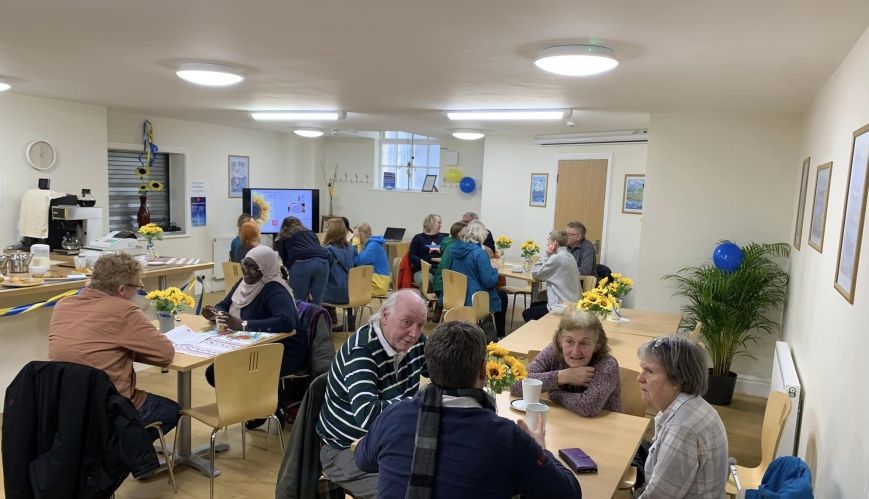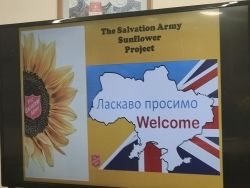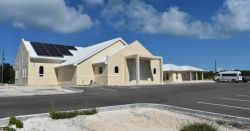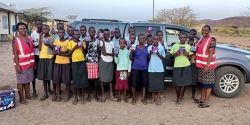International news briefs: 26 January 2023

International news briefs: 26 January 2023
The Sunflower Cafe and community hub in the Scarborough Citadel, UK, provides a place of friendship, integration and assistance to Ukrainian refugees and the local community.
Community hub integrates refugees and locals
The Scarborough Citadel in the UK recently launched the Sunflower Cafe and community hub to help support Ukrainian refugees on 13 January 2023. More than 120 Ukrainians have arrived in Scarborough and surrounding areas over the past year.
The cafe will feature Ukrainian dishes cooked on-site and will open on Fridays as soon as additional staff can be recruited. The community hub is operational and will be open to all residents every Friday afternoon. The hub will offer English language classes, practical assistance and training to help people find employment.
 The Scarborough Citadel’s Sunflower Project offers a warm welcome to all.
The Scarborough Citadel’s Sunflower Project offers a warm welcome to all.
The initiative works in partnership with the Scarborough Sunflower Appeal, a local group that assists Ukrainian refugees.
“We want to create a home from home for refugees, many of whom have fled with few belongings and do not know when or if they will ever return home,” said Corps Officer Major Stephen Noble with his wife, Captain Angela Noble.
“There are many ways we can help each other, and we want to be a hub that benefits both refugees and the local community. It can be challenging for refugees arriving into a new culture, as well as for the community, so we hope this will improve integration, build relationships and help friendships blossom.
“We would also love to hear from volunteers who would like to help support our special guests. The simple task of welcoming and developing conversational skills for Ukrainians in a new language could prove transformational for life in a new home and community.”
Stephen was part of a Salvation Army International Emergency Services response team at the Romania-Ukraine border last year, soon after the Russian invasion of Ukraine on 24 February.
From violence to salvation: New building in Caribbean facilitates life changes
A new Salvation Army building on the Caribbean island of Providenciales is facilitating programs for children and youth, as well as offering a wide range of community services.
Providenciales is part of the Caicos Islands, which is part of the Turks and Caicos Islands British Overseas Territory. The Salvation Army Caribbean Territory oversees the work in this region.
 The new building in Providenciales will help change lives in the community.
The new building in Providenciales will help change lives in the community.
The new building is multipurpose: it provides meals for those in need, including children; offers a women’s crisis centre and a skills training centre; and serves as a hurricane shelter. The facility includes a kitchen, bathrooms, showers and a laundry.
The building is also available to rent for occasions such as weddings and receptions, trainings, graduations, and other events.
Major Roodolph Meo, Divisional Commander for The Bahamas and Turks and Caicos Islands, said The Salvation Army has already been providing hot meals for children across Providenciales, but with its own state-of-the-art kitchen, should be able to “serve even better”.
He also said that with the new facility, The Salvation Army would embark on a program to guide young people away from a life of crime.
“This year, we are trying to see how we can get the young men off the street and try to change their minds from violence, from gangs and towards salvation,” he asserted.
“This edifice is going to be the lighthouse of Turks and Caicos, helping to get these young people out of the trap that is going on here so that we can give them a chance in life to succeed. And we have been doing that without an edifice. But having it now is going to put the seal to the deal.”
Commissioner Devon Haughton, Caribbean Territorial Commander, said people in Turks and Caicos should now see a more visible Salvation in their community.
“In The Salvation Army, one of our slogans is ‘Soup, Soap and Salvation’, and ‘Heart to God, Hands to Man’,” he stated. “So, our drive is to bring a ministry that would touch the social fabric of this island ... to be ready and available to address some of the immediate needs as we get the opportunity to do so.
“One of the challenges is that people see the social movement of The Salvation Army, but a lot of times, they are not aligning it with our Christian commitment and our first allegiance, which is to Almighty God. So, everything that we do stems out of our relationship with God ... that’s our foundation.”
Donations from local residents and businesses largely funded the new building, for which The Salvation Army is extremely grateful.
Kenya territories tackle drought crisis
East Africa is facing extreme drought and a food security crisis, which has been caused by a combination of circumstances. In Kenya, five consecutive years in which the rains failed or fell short have caused the price of staple foods and water to become unaffordable for many people. The situation has been greatly worsened by the rising cost of grain worldwide because of the war in Ukraine and the difficulties in travel, production and labour brought on by the COVID-19 pandemic.
A United Nations report states that the number of people enduring crisis or emergency levels of food insecurity in Kenya has more than doubled from 1.4 million in 2021 to 3.1 million in 2022. Harvests are failing due to a lack of rain, and livestock is dying because there is no food.
The Salvation Army in Kenya, formed of the Kenya West and Kenya East Territories, is finding ways to help people in the worst-hit areas.
 The Salvation Army in Kenya has been working for several years assisting communities hard hit by crippling drought.
The Salvation Army in Kenya has been working for several years assisting communities hard hit by crippling drought.
Captain Benjamin Omugah, Emergency Officer for Kenya West, said: “The situation is worsening daily. It has led to a sharp rise in food prices and a deterioration in food security.” The Turkana region has faced weather- and climate-based difficulties every year since at least 2017.
Schools are being badly affected. With ever-increasing proportions of income having to be spent on food and water, people are struggling to pay school fees, meaning that many children have to drop out.
The price of water and grain/meal means the cost of feeding students has also risen sharply, forcing schools to spend funds on food that should be used for basic supplies. This problem has worsened because of the number of families who can no longer pay their fees.
The Salvation Army is putting in place a ‘Food for Fees’ initiative, which will provide food to schools to feed students and, in return, the schools can cut school fees in the knowledge that they no longer have to find funds for school meals. This solution benefits the children, their families and the schools while also encouraging parents to keep their children in school.
The initial stage of the project will provide food to nine secondary and 50 primary schools in northern Turkana. The amount given will ensure that each child enrolled in the programme will receive three main meals and two snacks daily for three months. Schools where water is unavailable will be supplied using The Salvation Army’s bowser/tanker, which is based at its Turkana office.
The Kenya East Territory is responding in a slightly different way. It has identified farmers as facing the most urgent difficulties. The next rainy season – which is not guaranteed – is anticipated to start in late October, after which farmers will need to wait for at least two months before harvesting vegetables. Therefore, The Salvation Army is planning to provide relief food that will enable farming communities to survive for three months. Emergency Officer Captain Isaac Kyale said: “The drought is now a threat to animals and human life. The inflation rate is too high, and the cost of basic commodities is unbearable.”
Food parcels are being distributed to 2327 households in 83 communities. Each parcel will include maize, beans, cooking oil and personal hygiene items, including three one-kilogram bars of soap.
The territory is also planning to help schools in 24 communities, 18 of which are run by The Salvation Army. The schools will be given enough food to provide every pupil with one nutritious meal per day for three months, together with hygiene supplies.
Comments
No comments yet - be the first.